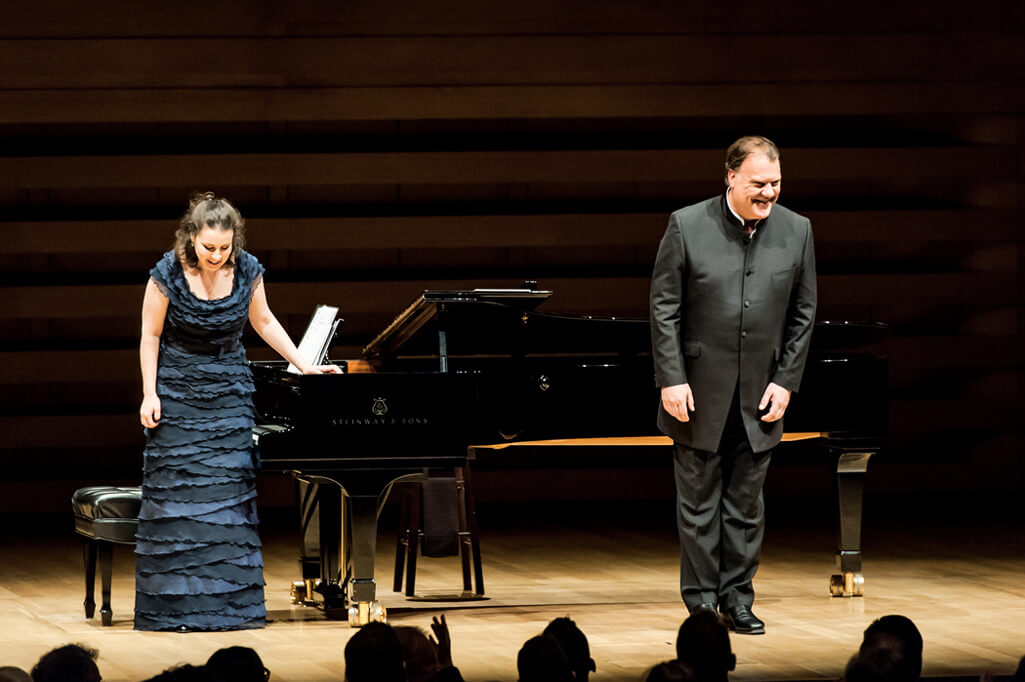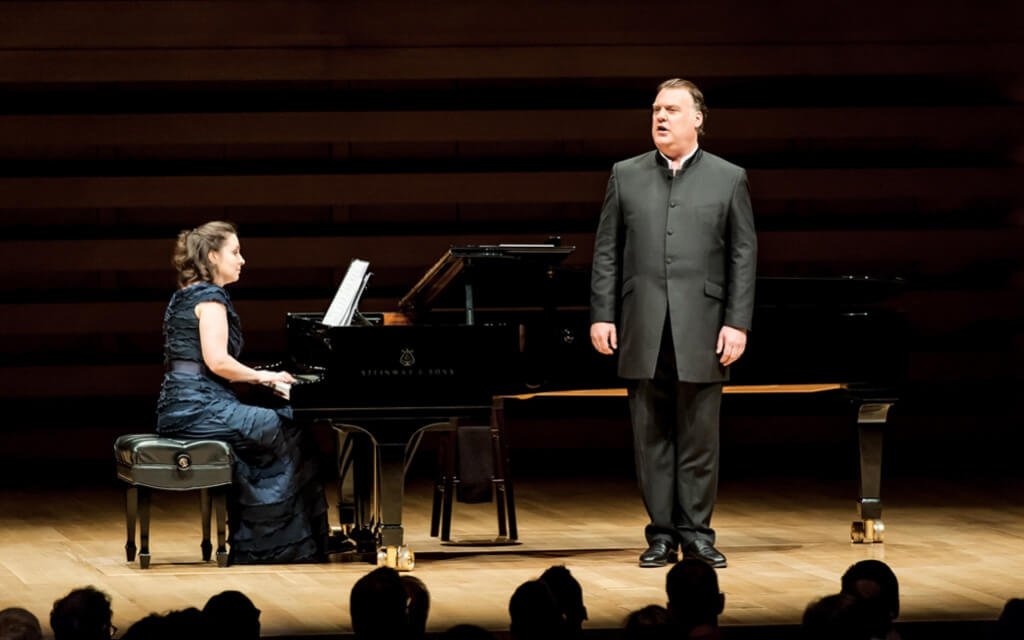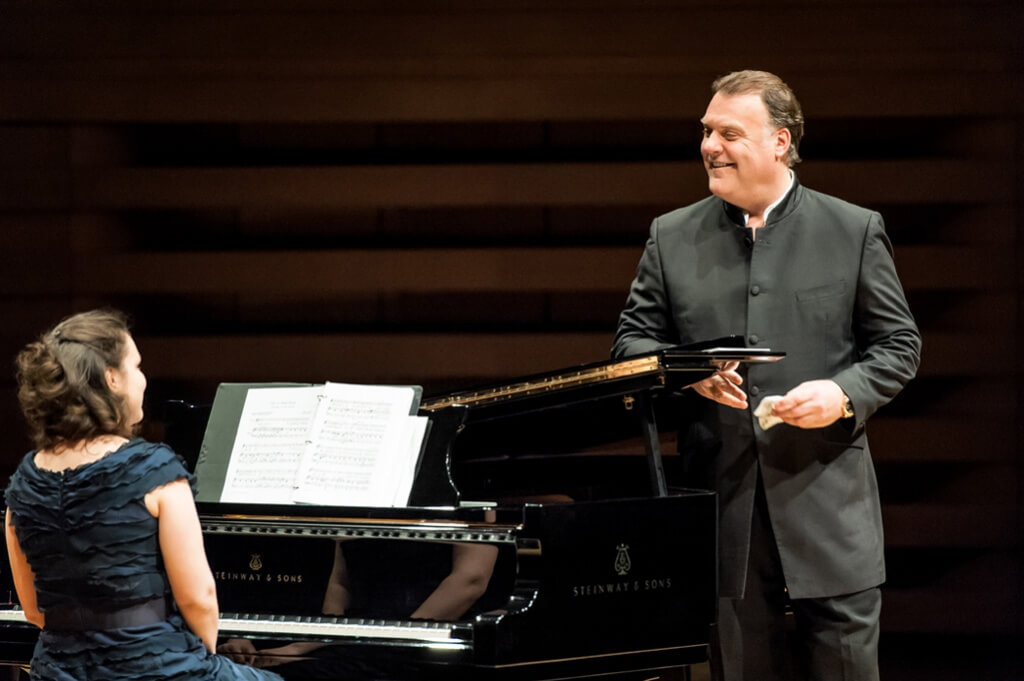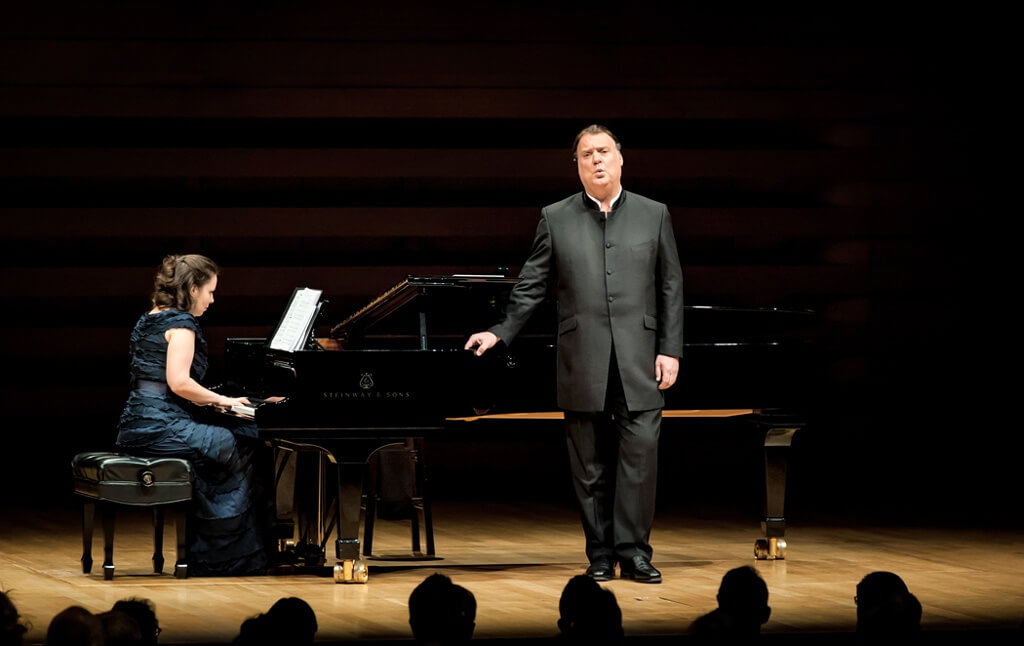The charismatic baritone gives a masterclass on how to enrapture an audience.

Bryn Terfel & Natalia Katyukova at Koerner Hall. Sunday, April 24.
One of the most beloved of operatic baritones returned to Toronto for a recital last Sunday afternoon. The Welshman Bryn Terfel leapt to fame by winning the Song Prize at the prestigious 1989 Cardiff Singer of the World competition. It was a very hotly contested year, with Terfel battling it out with Siberian baritone Dmitri Hvorostovsky. That was a particularly good year, with two absolutely phenomenal voices — in this case, both baritones — vying for the top prize. For the curious, clips of their 1989 competition can be viewed on YouTube.
In the end, the title of Singer of the World went to the Siberian. Unlike most competitions where there are many prizes, and for many years, there was only one prize in Cardiff. For their effort, the winner gets a Welsh cut crystal bowl. And one never reads about the monetary reward. The main thing for Cardiff is the tremendous prestige associated with it. Fortunately, the Song Prize was created in the nick of time, thanks to the exceptional Finnish soprano Soile Isokoski, who was so magnificent in her Lieder/Art Song selections in the previous competition that the organisation decided to launch a Song Prize. Isokoski was the unofficial winner of the Song Prize. The following competition, Terfel was the first official Song Prize winner. Some may argue that Terfel came out second best. But you know what? In the end, both were winners. They went on to amazing careers, two of the brightest stars in the operatic firmament.
Now, nearly twenty-seven years later, both are still in front of the public, still sounding wonderful. Singers are human, and often life intervened. Hvorostovsky was diagnosed with a brain tumour a year ago. By a miracle, his treatment worked and he is now in remission. He gave a fabulous recital a few months ago at Koerner Hall. Terfel has had his ups and downs in his personal life, well publicised at the time. But in the end, both have remained true to their art and continue to perform at the highest level despite adversity.
Terfel’s visit this past Sunday after a long absence generated a great deal of excitement. His Koerner Hall debut was long sold out, and the rush ticket purchasers filled the choir loft. I spotted many voice aficionados as well as present and former singers in the audience. The audience was in a festive mood, greeting Terfel with vociferous applause before he sang a note. Terfel began with a group of Welsh folk songs. In excellent form, his warm, robust sound and inimitable stage persona very much in evidence. Terfel sang the songs with a refulgent tone and plenty of expression.
- SCRUTINY | Opera Atelier’s All Is Love Makes Triumphal Return - April 15, 2024
- SCRUTINY | From The Heart: Ema Nikolovska And Charles Richard-Hamelin Offer Unique Program At Koerner Hall - March 26, 2024
- SCRUTINY | The Glenn Gould School Spring Opera Presents A Superb Dialogues Des Carmélites - March 22, 2024
Whether it was triple forte highs or the softest mezza voce middle, his voice with its warm, engaging timbre was in excellent shape. He did tend to croon a bit, but hey, Jon Vickers used to do it so who am I to quibble? As is sometimes the case, the over-eager Toronto audience burst into applause between numbers within the same group. When it continued, Terfel gently reminded the audience (I’m paraphrasing): “if you want to applaud between songs, that’s nice. But if you hold the applause to the end, we can all go home sooner…” That, of course, brought forth gales of laughter from the house. Believe it or not, a few in the audience persisted, but Terfel turned it into a joke, chiding the offenders in a light-hearted way: “I can see you, up in the balcony, third from the left!” What a character!
The Welsh group was followed by “Three Salt-Water Ballads” by Frederick Keel. These are pieces that the baritone probably could sing in his sleep. The poignant “Port of Many Ships” was given plenty of charm and wistfulness, his attention to the text exemplary. In “Trade Winds” he turned the word “squeaking” into an onomatopoeia! There’s something really wonderful when a singer is secure and relaxed enough in a recital to totally have his way with the text like Terfel was doing. Through it all, he spoke to the audience, liberally regaling them with anecdotes connected with the songs. Honestly, if he had chosen a different career path — as a standup comic perhaps – he probably could have made even more millions than in opera.
Then it was on to the Jacques Ibert’s Don Quichotte songs, standard concert repertoire for the baritone. His warm tone sounded just marvellous, conjuring up the sun-baked landscape of Spain. The last, “Chanson de la mort” with the soft high note at the end, sung so soft as to be almost inaudible, was incredibly affecting. To my ears, the Belgian Jose Van Dam sets the gold standard in this song. Terfel didn’t erase the memory of Van Dam, but he was pretty darn good! I don’t mean to quibble, but on this occasion when Terfel sang high fortissimos, sometimes he would go off-pitch, going a bit sharp or lose focus, although given the larger context it hardly mattered.
Ending the first half was more Welsh folk songs arranged by Bryan Davies — six sung in Welsh Gaelic and one in English — “Little Welsh Home.” Folksongs tend to be mostly composed in the minor key, better to tug at the heart-strings I suppose. And tug he did, all dispatched with plenty of feeling by Terfel, a singer who wears his emotions on his sleeve, a shining example of why the song is such as powerful part of the Welsh cultural identity.
After an intermission, Terfel sang Schumann and Schubert, beginning with the very substantial (and not often programmed) Belsatzar by Schumann. This is quite a vocally demanding piece, and he sang it very dramatically, even operatically. The great story-teller he is, Terfel did it superbly. So far I haven’t mentioned his pianist, Natalia Katyukova. She was simply, truly marvellous in the way she supported the singer. It takes a terrific musician to do what she did that afternoon, a bit self-effacing but strong at the same time, at the service of the music. Terfel told the audience he coached Boris Godunov with her. No wonder. The Schubert on the program were all chestnuts, from “Liebesbotschaft” to “Auf dem wasser zu singen” to “Die Taubenpost,” everything sung with gorgeous tone and vivid imagination.
Just when the audience thought that was the end of the formal program (albeit a bit short in the second half), Terfel said they left out the last group in the printed program! It was three songs associated with the Welsh American singer John Charles Thomas. Terfel proceeded to sing a very operatic rendition of “The Lord’s Prayer,” a piece I understand was written for Thomas. Then it was “Home On the Range,” during which Terfel actually encouraged the audience to sing along! And quite a few did. After all, who wouldn’t want to say they have sung with Bryn Terfel?!
“The Green-Eyed Dragon” followed another John Charles Thomas speciality. By then, Terfel had the audience eating out of his hand. “If I Were A Rich Man” from Fiddler On The Roof only added to the frenzy. Terfel ended with Mefistofele’s aria from the opera with the same name by Arrigo Boïto — I have to say Terfel has the best and loudest whistle of any singer I’ve encountered! A marvellous way to spend a Sunday afternoon.
#LUDWIGVAN
Want more updates on Toronto-centric classical music news and review before anyone else finds out? Get our exclusive newsletter here and follow us on Facebook for all the latest.
- SCRUTINY | Opera Atelier’s All Is Love Makes Triumphal Return - April 15, 2024
- SCRUTINY | From The Heart: Ema Nikolovska And Charles Richard-Hamelin Offer Unique Program At Koerner Hall - March 26, 2024
- SCRUTINY | The Glenn Gould School Spring Opera Presents A Superb Dialogues Des Carmélites - March 22, 2024






